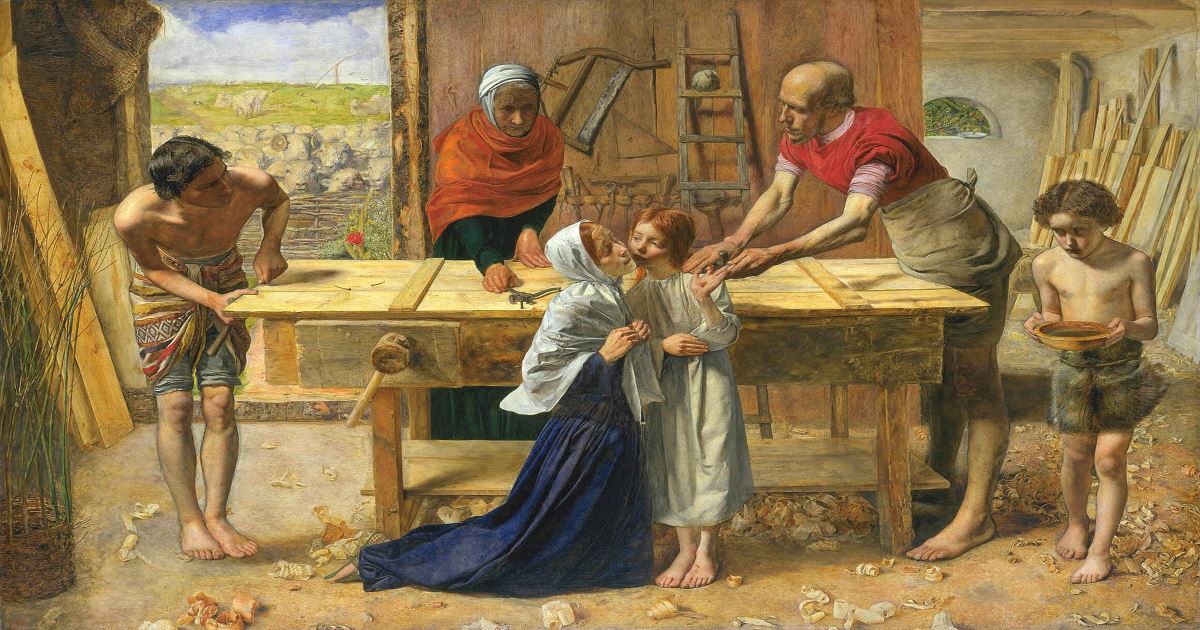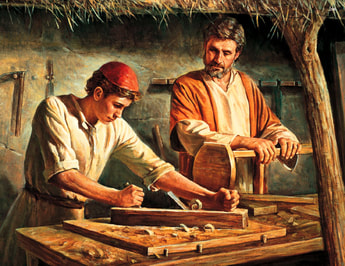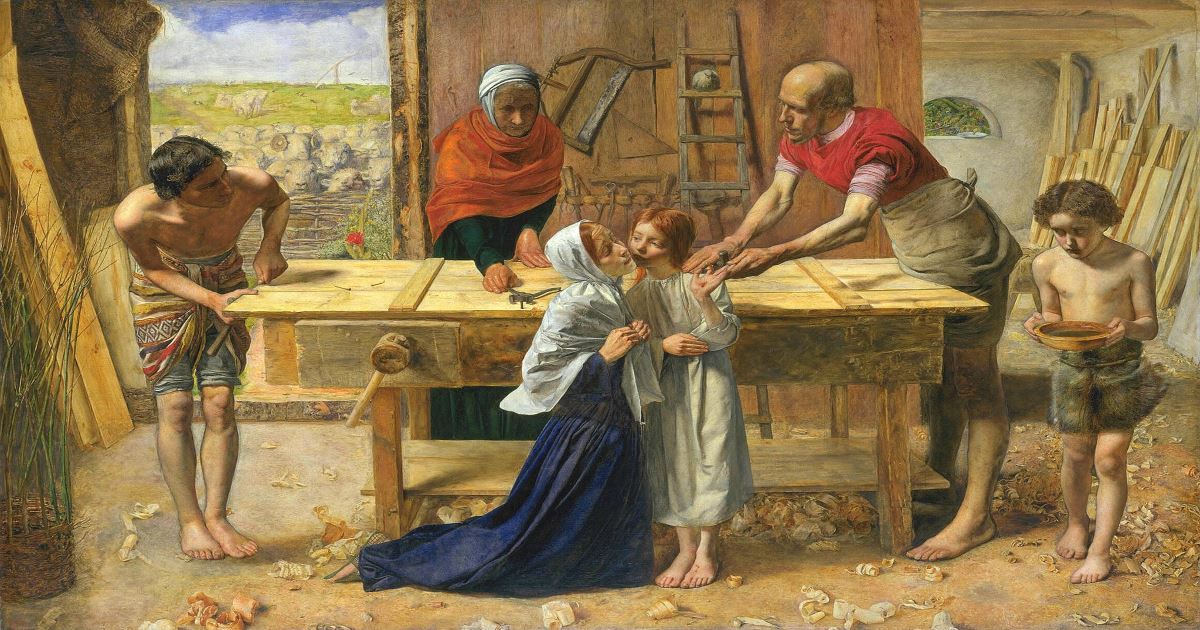Did Jesus do carpentry work? That’s a fascinating question that has intrigued many people throughout history. Let’s dive into the topic and explore whether Jesus, the central figure of Christianity, had a background in carpentry.
When you think about Jesus, you might picture him preaching, performing miracles, or gathering his disciples. But did you know that Jesus is also believed to have worked as a carpenter?
According to the Bible, Jesus was referred to as a carpenter, which suggests that he had experience in working with wood and constructing things. This aspect of his life, although not extensively documented, provides an interesting perspective on his early years. So, did Jesus really practice carpentry? Let’s find out!
Many theologians believe that Jesus did work as a carpenter before he began his ministry. While the Bible doesn’t provide explicit details, it mentions Jesus as the “carpenter’s son.” This suggests that Jesus likely learned and practiced the trade. Carpentry work would have been an essential skill during that time and place. It’s fascinating to think about how Jesus may have used his carpentry skills to serve and connect with people before embarking on his divine mission.

Did Jesus Do Carpentry Work?
Jesus Christ is one of the most well-known figures in history, revered by millions around the world. While his teachings and miracles are widely known, there is debate about his occupation before he began his ministry. According to the Bible, Jesus was a carpenter. This article delves into the evidence supporting the notion that Jesus did indeed work as a carpenter, examining historical references, cultural context, and biblical passages.
Historical Evidence of Jesus as a Carpenter
Historical evidence regarding Jesus’ occupation is scarce, but there are a few references that support the idea of him being a carpenter. The term used in the Bible to describe Jesus’ occupation is “tekton” in Greek, which translates to carpenter or craftsman. This suggests that Jesus was skilled in working with wood and constructing objects. Additionally, Jesus is referred to as the “son of a carpenter” in the Gospel of Matthew, further strengthening the belief that he worked in this profession.
Furthermore, during Jesus’ time, the region of Galilee was known for its prosperous carpentry industry. The area was rich in timber resources, making it an ideal location for carpenters to ply their trade. It is likely that Jesus would have grown up in this environment and learned the trade from his earthly father, Joseph, who is also described as a carpenter in the Bible.
While there may not be abundant historical evidence specifically identifying Jesus as a carpenter, the cultural and historical context of his time strongly support the idea that he did indeed work in this profession.
Biblical References to Jesus’ Carpentry Work
The Bible provides several references that shed light on Jesus’ occupation as a carpenter. In the Gospel of Mark, Jesus is referred to as “the carpenter” when he returns to his hometown of Nazareth, indicating that his profession was well-known among the people. This suggests that Jesus had a reputation as a skilled craftsman within his community.
Additionally, the New Testament mentions that Jesus and his family resided in Nazareth, a small village with a population predominantly engaged in agricultural and craftsmanship activities, including carpentry. It is plausible to assume that Jesus, being part of a working-class family, would have played a role in supporting his family through his skills as a carpenter.
Another intriguing reference is found in the Gospel of John, where Jesus is identified as a carpenter who crafted a whip and drove merchants out of the temple. This incident showcases Jesus’ ability to create functional objects out of wood and demonstrates his strength and authority in his chosen profession.
Jesus’ Carpentry Work: Influence and Significance
Jesus’ work as a carpenter serves as an important aspect of his life and teachings. Through his humble occupation, he exemplified the values of hard work, craftsmanship, and providing for one’s family. By engaging in manual labor, Jesus demonstrated the dignity and worthiness of all types of work, regardless of societal status or prestige.
Furthermore, Jesus’ work as a carpenter can be seen as a metaphor for his larger mission on earth. Just as he shaped and crafted wood into functional objects, Jesus sought to transform and shape the lives of people. His ultimate purpose was to bring spiritual healing, lovingly mending broken hearts and restoring hope.
Overall, while the evidence for Jesus’ profession as a carpenter may be limited, the historical context, biblical references, and cultural factors strongly indicate that he did work in this skilled trade. By understanding Jesus’ carpentry work, we gain insights into his character, values, and the significance of his earthly occupation.
The Impact of Jesus as a Carpenter on His Ministry
The fact that Jesus worked as a carpenter before beginning his ministry had a profound impact on his teachings and the way he related to people. The skills and experiences he acquired through his trade influenced the way he communicated his message, connected with his followers, and even performed miracles.
Carpentry as a Metaphor
Jesus often used parables and metaphors drawn from everyday life to convey his teachings. As a carpenter, he was intimately familiar with the tools and materials of his trade. This allowed him to use carpentry-related imagery and analogies to help people understand profound spiritual concepts. For example, he spoke of building a solid foundation on rock in one of his famous sermons, drawing parallels between constructing a house and building one’s life upon a firm and unshakeable faith.
The carpenter’s craft also taught Jesus the importance of craftsmanship and attention to detail. This is evident in his meticulous approach to his ministry. He poured his heart and soul into his work, ensuring that every message, every healing, and every action was done with love and precision. Just as a skilled carpenter pays attention to every detail, Jesus demonstrated an unwavering commitment to excellence in his ministry.
Relatability and Empathy
Jesus’ background as a carpenter allowed him to connect with people from all walks of life. His trade positioned him as a member of the working class, not royalty or a scholar. This relatability made him approachable and relatable to the common people, who often found it difficult to connect with religious or political leaders of the time.
Furthermore, Jesus encountered people from various backgrounds during his carpentry work. It is likely that he interacted with people who were struggling financially or facing daily hardships. These experiences would have deepened his understanding of the struggles and challenges faced by ordinary individuals. His trade gave him a unique perspective on the joys and sorrows of everyday life, which he incorporated into his teachings and interactions with others.
The Miraculous Carpenter
Jesus’ career as a carpenter also played a role in his miracles. His proficiency in working with wood enabled him to perform supernatural acts through physical objects. The most notable example is the transformation of water into wine at the wedding feast in Cana. In this miraculous event, Jesus demonstrated his ability to turn ordinary materials into something extraordinary, just as a carpenter transforms raw wood into beautiful and functional objects.
In conclusion, Jesus’ work as a carpenter greatly influenced his ministry. His trade provided him with relatability, a deep understanding of human struggles, and the ability to use powerful metaphors to convey spiritual truths. Jesus’ carpentry skills also played a role in the performance of miracles, showcasing his power and authority. By recognizing the impact of Jesus’ carpentry background, we gain a deeper appreciation for his teachings and the unique way in which he connected with people.
Key Takeaways – Did Jesus Do Carpentry Work?
- Yes, according to the Bible, Jesus was known as a carpenter.
- Jesus learned the trade from his earthly father, Joseph.
- He worked with wood and created useful items like furniture and tools.
- Jesus’ carpentry skills teach us the value of hard work and humility.
- Although Jesus is mainly known for his ministry, his time as a carpenter shows us the importance of everyday work and serving others.
Frequently Asked Questions
Curious to learn more about Jesus and his carpentry work? Below are some common questions about this topic:
1. What occupation did Jesus have before he started his ministry?
Before Jesus began his ministry, he worked as a carpenter, following in the footsteps of his earthly father, Joseph. As a carpenter, Jesus would have created and repaired various wooden structures such as doors, furniture, and even buildings. This occupation provided him with valuable skills and knowledge that were later reflected in his teachings.
It is said that Jesus was known as a “tekton” in Greek, which translates to “builder” or “craftsman.” This profession would have required precision, attention to detail, and hard work, all qualities that resonated in Jesus’ later mission to build a spiritual foundation for his followers.
2. How do we know that Jesus was a carpenter?
The Bible provides evidence of Jesus’ occupation as a carpenter. In the book of Mark, Jesus is referred to as “the carpenter” (Mark 6:3), and in the book of Matthew, he is mentioned as “the son of the carpenter” (Matthew 13:55). These references indicate that Jesus was recognized within his community as a skilled craftsman.
Additionally, during his ministry, Jesus often used parables and metaphors related to everyday life, including references to carpentry. This suggests that his experience as a carpenter influenced his teachings and allowed him to connect with people through relatable examples.
3. Did Jesus’ carpentry work impact his ministry?
Yes, Jesus’ experience as a carpenter played a significant role in shaping his ministry. As a carpenter, Jesus would have interacted with people from various walks of life, honing his interpersonal skills and deepening his understanding of human nature. This understanding and empathy would later be reflected in his teachings and interactions with others.
Furthermore, Jesus often used metaphors and parables related to carpentry to convey his messages. For example, he compared himself to a cornerstone (a foundational stone in construction) and referred to the importance of building one’s life on a solid foundation. These references to carpentry demonstrated a deep understanding of his trade and allowed him to effectively communicate spiritual truths to his audience.
4. Are there any specific instances in the Bible that mention Jesus’ carpentry work?
While the Bible doesn’t provide specific stories about Jesus’ carpentry work, there are instances where his occupation is implied. For example, in John 1:45, Philip refers to Jesus as “Jesus of Nazareth, the son of Joseph.” The mention of Joseph, who was a carpenter, suggests that Jesus would have been involved in his father’s profession.
Additionally, Jesus’ upbringing in a carpenter’s household would have shaped his character and influenced his approach to life and ministry. The values of hard work, craftsmanship, and attention to detail instilled in him through his early years would have influenced his teachings and the way he related to others.
5. What can we learn from Jesus’ carpentry work?
Jesus’ carpentry work teaches us the value of humility and embracing all aspects of life, including the more mundane and ordinary tasks. Despite having a divine purpose, Jesus did not shy away from physical labor and embraced the role of a humble carpenter.
His example encourages us to find meaning and purpose in our everyday tasks, no matter how small or insignificant they may seem. Jesus’ carpentry work also highlights the importance of craftsmanship and doing our best in every endeavor, even in tasks that may seem ordinary or unimportant. It reminds us that every job and every aspect of life can be an opportunity to learn, grow, and make a positive impact.

Was Jesus A CARPENTER or A STONE MASON?
Summary
So, did Jesus do carpentry work? Well, the Bible tells us that he was indeed a carpenter. He most likely learned the trade from his earthly father, Joseph. While we don’t have many details about Jesus’ specific carpentry work, we can infer that he would have been skilled in woodworking and construction.
Despite Jesus’ importance as a spiritual leader, it’s fascinating to consider that he also had practical skills as a carpenter. This shows us that Jesus understood the value of hard work and craftsmanship. It reminds us that no matter what our occupation may be, we can find meaning and purpose in our daily tasks, just as Jesus did in his work as a carpenter.
